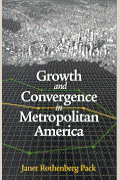With the economy still reeling from the effects of the recession, metropolitan areas have become increasingly willing to explore new approaches to economic development. Moving away from traditional one-size-fits-all approaches that emphasized Starbucks, stadium-building, and stealing businesses, metro leaders are instead crafting metropolitan business plans that grow jobs from within, building on their distinct market advantages.
By partnering with private industry, nonprofit intermediaries, universities, civic leaders, research institutions, and other interested parties, regional public sector leaders are working to strengthen their economies by focusing on those industries with the greatest potential for future growth.
For some regions, these efforts have involved helping existing firms make the transition to emerging industries. Northeast Ohio’s long struggle with post-deindustrialization was made worse by the Great Recession and the collapse of the auto sector and the foreclosure crisis.
In response, regional leaders came together to launch PRISM, the Partnership for Regional Innovation Services to Manufacturers initiative. The goal of PRISM is to help small and medium-sized manufacturers in old commodities industries, like steel and automotive, reinvent their products and business models to take advantage of growth opportunities in emerging markets like bio-science, health care and clean energy.
Led by the Manufacturing Advocacy and Growth Network (MAGNET), a regional intermediary organization, PRISM brings together higher education institutions, regional economic development organizations, and Ohio’s Edison Technology Centers to provide market research and business consulting services, increase firms’ access to capital and talent, and foster stronger relationships within growing industry clusters. [Full disclosure: The Brookings-Rockefeller Project on State and Metropolitan Innovation provided initial advisory support to PRISM.]
“Through PRISM, we hope to demonstrate that a growing manufacturing sector is not only possible, but desirable for the region,” says MAGNET president and CEO Daniel Berry. “Reclaiming the legacy of manufacturing innovation in Northeast Ohio will enable the region’s companies to create more well-paying jobs.”
In other parts of the country, partnerships are linking up existing industry strengths to create new growth opportunities. To ensure the Seattle region continues to be a global hub of innovation, public and private sector leaders have formed the Building Energy-Efficiency Testing and Integration (BETI) Center and Demonstration Network to develop new products, services and technologies around energy efficiency for customers around the world. BETI capitalizes and integrates this region’s distinct, competitive advantages – unparalleled software and information technology, strong sustainability ethos, an emerging building energy efficiency sector, and strong post-secondary institutions and talent that can support future demand. This is not a cookie cutter idea but one that can best work with the market formula found in the Puget Sound region.
With financial support from a federal i6 Green Challenge grant and a state match, BETI will help local businesses commercialize innovations in building energy-efficient technologies, platforms, and materials by providing product validation and integration services. In addition, BETI will foster greater collaboration among industry stakeholders, including businesses, entrepreneurs, trade associations, local and state government agencies, state universities, research networks, venture capitalists, and regional utilities.
Both Northeast Ohio and the Puget Sound region arrived at these collaborative partnerships during the course of their efforts to develop metropolitan business plans. Like private sector business plans, these regional economic development plans are rooted in market dynamics and competitive assets. The metropolitan business planning process offers a framework for regional business, civic, and government leaders to assess their metro’s distinctive market position, identify pragmatic economic development strategies that capitalize on regional assets and set forth detailed implementation-ready plans for economic growth. Once established, these metropolitan business plans will act as roadmaps for metro economies as they drive the nation toward greater prosperity, increased job creation, and a leading position in the next economy.







Commentary
Metropolitan Business Plans Bring Regional Industries Into the 21st Century
January 20, 2012